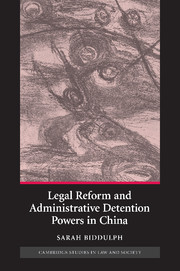Book contents
- Frontmatter
- Contents
- Preface
- Abbreviations
- Part 1 Introduction and conceptual framework
- 1 The problems of legal reform of police administrative detention powers
- 2 The legal field and the process of legal reform since 1978
- Part 2 Social order and administrative detention
- Part 3 Legal reform and its impact on administrative detention
- Part 4 Analysis and conclusion
- Appendix 1 Index of Legislation, administrative regulations, rules, normative documents, Party documents, speeches and cases
- Bibliography
- Index
1 - The problems of legal reform of police administrative detention powers
Published online by Cambridge University Press: 27 July 2009
- Frontmatter
- Contents
- Preface
- Abbreviations
- Part 1 Introduction and conceptual framework
- 1 The problems of legal reform of police administrative detention powers
- 2 The legal field and the process of legal reform since 1978
- Part 2 Social order and administrative detention
- Part 3 Legal reform and its impact on administrative detention
- Part 4 Analysis and conclusion
- Appendix 1 Index of Legislation, administrative regulations, rules, normative documents, Party documents, speeches and cases
- Bibliography
- Index
Summary
INTRODUCTION
This book examines the impact of rebuilding the Chinese legal system since 1978 on the administrative detention powers of the Chinese public security organs (gong'an jiguan 公安机关, also referred to in this book as the ‘police’). The regulation and exercise of police administrative detention powers have arguably been amongst the most problematic areas in the programme of rebuilding China's legal system in the reform era. Until recently, the process of reconstructing the legal system appeared to have limited impact on the definition and exercise of these powers. This has been so for at least two reasons.
First, administrative detention powers are exercised alongside the state's criminal justice powers to target conduct considered to be socially disruptive, to maintain public order, social stability and, ultimately, political stability. Consequently, there has been a high degree of political sensitivity surrounding these powers. Deng Xiaoping repeatedly asserted that success of the economic modernisation programme was premised on order and stability, a demand reiterated by Jiang Zemin. The maintenance of social control since the introduction of the economic modernisation policy in December 1978 has been so important that it has led sociologist Borge Bakken to comment that the policy of social control itself ‘has been one of the crucial pillars of reform’.
In recent years, problems of social disorder have worsened along with the deepening of inequities arising out of economic reform. The importance to the state of maintaining social order, control and stability has, if anything, heightened.
- Type
- Chapter
- Information
- Publisher: Cambridge University PressPrint publication year: 2007
- 1
- Cited by



